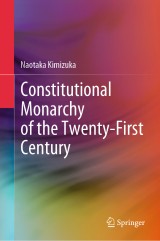Details

Constitutional Monarchy of the Twenty-First Century
|
139,09 € |
|
| Verlag: | Springer |
| Format: | |
| Veröffentl.: | 01.07.2024 |
| ISBN/EAN: | 9789819743278 |
| Sprache: | englisch |
| Anzahl Seiten: | 200 |
Dieses eBook enthält ein Wasserzeichen.
Beschreibungen
<p>This is the first book to investigate how constitutional monarchy could survive in the twentieth and twenty-first centuries, during which many monarchies were overthrown by revolutions or <em>coups d’état</em> in Asia, the Middle East, Africa and Europe. Today we have about 200 countries in the world, but there are only 28 which have their own monarchical sovereigns – emperor, king, queen, grand duke, prince, sultan or emir – and even if we add the Commonwealth realms to these, we would find almost three-quarters of the globe are republics at this moment. So will monarchy disappear from human history in the not-too-distant future? This book shows how the European monarchs have played important roles not only as heads of state, but also as heads of nation, in which they are symbols of unity and national identity, of continuity and stability, fountainheads of national achievement and success, and supporters of social service. Consequently they have grappled with difficult contemporary issues such as social welfare, the global environment, the protection of wildlife, multiculturalism and the LGBT movement which national governments would not be able to deal with sufficiently in each country. This book also suggests reforming the existing emperor system of Japan in reference to the activities of European constitutional monarchy.</p>
<p>Introduction.- What is a Constitutional Monarchy?.- The Formation of British Constitutional Monarchy.- The Completion of British Constitutional Monarchy.- The Modern British Royal Family.- The Nordic Royal Families – the Leading-edge of Modern Monarchy.- The Royal Households of the Benelux Countries – An Example of Abdication during Lifetime.- The Future of Monarchy in Asia.- Conclusion: Can the Japanese Maintain the Symbolic Emperor System?.</p>
<p><strong>Professor Naotaka Kimizuka, </strong>Kanto Gakuin University, College of Intercultural Studies, earned a Ph.D. in history from the Graduate School of History at Sophia University in Tokyo. He was born in Tokyo in 1967. He is mainly studying British political and diplomatic history of the nineteenth century and comparative studies of monarchies around the world. He has published more than twenty books in Japan, including <em>Her Majesty’s Blue Ribbon: The Order of the Garter and British Foreign Policy</em>; <em>Queen Victoria</em>; <em>Queen Elizabeth II</em>; and <em>What is an Aristocrat?</em> He won the Suntory Prize for Social Sciences and Humanities (Politics and Economy) in 2018 with his <em>The Current State of Constitutional Monarchy</em>, the Japanese original version of this book. He had been an advisor to the Department of Decorations and Medals in the Cabinet Office and also to the National Security Council in the Cabinet Secretariat.</p>
<p>This is the first book to investigate how constitutional monarchy could survive in the twentieth and twenty-first centuries, during which many monarchies were overthrown by revolutions or <em>coups d’état</em> in Asia, the Middle East, Africa and Europe. Today we have about 200 countries in the world, but there are only 28 which have their own monarchical sovereigns – emperor, king, queen, grand duke, prince, sultan or emir – and even if we add the Commonwealth realms to these, we would find almost three-quarters of the globe are republics at this moment. So will monarchy disappear from human history in the not-too-distant future? This book shows how the European monarchs have played important roles not only as heads of state, but also as heads of nation, in which they are symbols of unity and national identity, of continuity and stability, fountainheads of national achievement and success, and supporters of social service. Consequently they have grappled with difficult contemporary issues such as social welfare, the global environment, the protection of wildlife, multiculturalism and the LGBT movement which national governments would not be able to deal with sufficiently in each country. This book also suggests reforming the existing emperor system of Japan in reference to the activities of European constitutional monarchy.</p>
Analyses the existing Japanese Emperor System and suggests reform by referring to constitutional monarchies of Europe Compares constitutional monarchies of Europe and absolute monarchies of Middle East and Asia Demonstrates significance of constitutional monarchy in the 21st century world dominated by a republic system

















